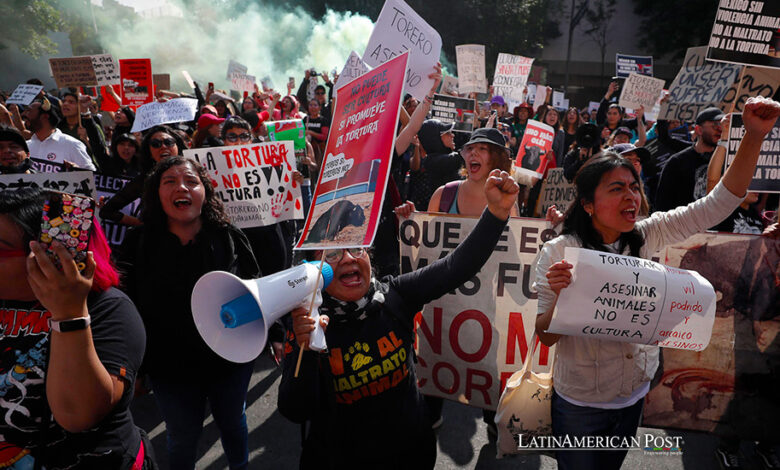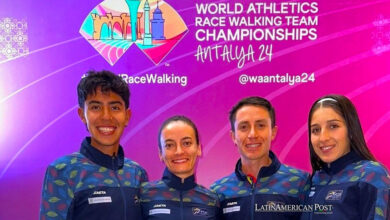Public Outcry in Mexico City Against Resumption of Bullfighting

Protestors in Mexico City rallied against the controversial return of bullfighting to Plaza Mexico, challenging a recent judicial decision that lifted the suspension of this tradition since May 2022.
Protesting the Return
In a significant display of public dissent, dozens of individuals in Mexico City took to the streets to voice their opposition to the return of bullfighting at Plaza Mexico. This move comes after a May 2022 judicial ruling suspended the activity, only to be overturned by a recent decision from the Supreme Court of Justice of the Nation (SCJN). The protestors united under chants like “Torero criminal, to the penal code!”, “If there’s torture, it’s not culture!” and “No more deaths of innocent bulls!” marched along Avenida Insurgentes, a major thoroughfare in the Mexican capital.
The protest against bullfighting extended beyond the march, with plans to demonstrate in front of Plaza Mexico, the afternoon bullfighting event venue. After more than 600 days of silence, the sound of trumpets will once again fill Plaza Mexico, a landmark of bullfighting in the Americas.
For nearly two years, the company managing the Monumental Plaza Mexico couldn’t host bullfights due to the district judge’s suspension. However, the SCJN’s decision on December 6 reversed this suspension, allowing aficionados to witness the art of Cúchares again. This decision has reignited debates and legal battles among animal rights defenders seeking to halt the tradition in Mexico City.
Injunctions and Protests: Pushing Back Against Bullfighting
Last Friday, the Liberal Left Parliamentary Association and the group “Todas y Todos por Amor a los Toros” filed an injunction against the resumption of bullfights in Mexico City. Called forth by anti-bullfighting organizations and animal rights advocates, Sunday’s protestors demanded “freedom” for the fighting bulls, viewing them as victims of torture during the ‘fiesta brava.’
Additionally, the Resistencia y Defensa Animal Collective launched a petition on change.org to gather signatures supporting the prohibition of bullfights in Mexico City.
Sunday evening’s bullfight at Plaza Mexico features Peruvian Andrés Roca Rey and Mexicans Joselito Adame and Diego Silveti, with bulls from Tequisquiapan owned by Fernando de la Mora.
The resurgence of bullfighting in Mexico City has sparked a contentious debate, highlighting a clash between traditional cultural practices and evolving views on animal rights and ethical entertainment. The protestors’ actions reflect a growing sentiment that questions the morality and relevance of such traditions in contemporary society.
This movement against bullfighting in Mexico City is part of a broader global trend where traditional practices involving animals are increasingly scrutinized for ethical reasons. Opponents argue that these practices are antiquated and cruel. At the same time, supporters claim they are a vital cultural heritage that should be preserved.
The legal tussles surrounding bullfighting in Mexico City underscore the complex interplay between cultural preservation, legal frameworks, and evolving societal values. The recent judicial decisions and public protests signify a pivotal moment in the city’s ongoing struggle to reconcile its rich cultural heritage with contemporary ethical standards.
Judiciary’s Role: Navigating Cultural Practices and Public Sentiment
The controversy also sheds light on the judiciary’s role in cultural practices. While courts often have to balance legal precedents with public sentiment, the bullfighting issue in Mexico City demonstrates the challenges of such decisions, especially when they touch upon deeply ingrained cultural traditions.
Also read: Mexico’s Televisa Nears Debut of Its Sports and Gaming Division Spin-off
The resumption of bullfighting at Plaza Mexico and the ensuing public outcry represent a critical juncture in Mexico City’s cultural and ethical landscape. As the debate continues, it raises crucial questions about the future of traditional practices in modern societies and the role of public opinion and legal action in shaping cultural norms. The outcome of this issue will likely have far-reaching implications for how artistic traditions are viewed and regulated in Mexico and beyond.



